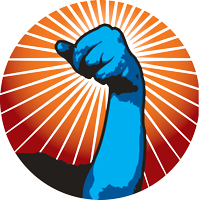20 Dec Matchstick Theory
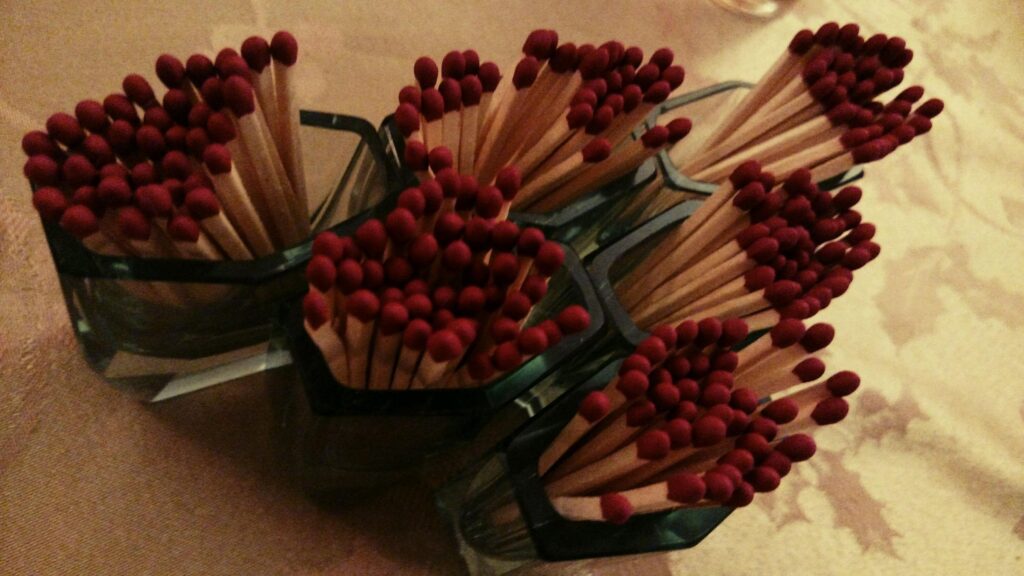
The first time I read Spoon Theory, like many others, I was inspired. As a woman who has dealt my entire life with chronic pain what grabbed my attention first was the friendship between Christine Miserandino and her friend. In any true friendship one doesn’t just share the joys and pleasures of life. One seeks to share in the pain, to understand it, and if possible to help hold that pain for the other.
Christine had this kind of friend. A friend that knew her inside and out, had earned the right to ask “what does it feel like to be you.” I have that kind of friendship with my girlfriend Dia. She knows me inside and out. The first one to visit me in the recovery room after surgery. The one that comes over and massages me on days when my arthritis is so flared I can’t move. Hell, she even flew all way home from Texas for one of my surgeries and then planted pink flamingoes in my yard as a welcome home surprise before she left. Dia, like Christine’s anonymous friend, has earned the right to ask “What does it feel like to be you?” and expect a full and honest answer. I fully believe that everyone should feel free and easy to seek knowledge about another’s life experience and asking questions is a great way to do that. However, I also whole heartedly believe that one has to earn the answer to that question.
And that is where I have a problem with Spoon Theory. Suddenly the whole world thinks they know what it’s like to be me. Except you don’t. Now we have all these dickheads running around handing out spoons, embroidering them on samplers and asking me in a condescending way “how are your spoons today?” I’ve grown so tired of spoons I’ve started eating my Lucky Charms with a fork.
Look, Spoon Theory is great and has inspired many of us, given us a safe, friendly, non-confrontational story to share with the people we love and who are also there for us every day. The good days and the bad. The happy times and the bat shit crazy times. Forgive me for saying this, but the rest of you don’t deserve a nice, safe, friendly and non-confrontational story. For those of you that have never suffered (or suffered with someone who had) chronic pain, 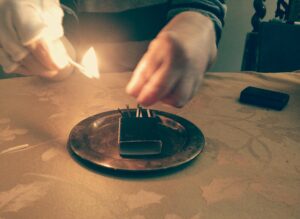 I give you Match Theory.
I give you Match Theory.
Imagine waking up each morning with one fresh pack of matches.
Get out of bed? Strike a match.
Watch it burn. Will it burn long enough to make it down the hall to the bathroom? Most Mornings? No. It will not.
Strike another match.
See I can get a lot of use out of a spoon. Most people can and do. That’s why the spoon analogy doesn’t work for me. I’ll use it to stir my coffee, eat my fruity pebbles and then grab out of the sink later to eat a whole tub of cookie dough. But a match? A match is a one-use item and it’s time is finite. Like my body and it’s go juice. Sometimes the unexpected happens.
Strike a match? It breaks mid strike. Somebody with no placard has taken the last handicapped spot in the lot. The snow plow cleared the parking lot but left all the snow piled up in the handicapped access, leaving no clear egress to the sidewalk.
Some mornings you wake up with a full pack of matches but some rat bastard has ripped off the striker. You’re not going anywhere today. This is what we call a flare up. The disease has your body in a vice and you probably couldn’t strike a match if you tried. There are many reasons for a flare. It could be a sudden shift in the barometric pressure; that late-night freak snowstorm the weatherman forgot to mention. It could be stress. Your boss has warned you that project must be on her desk by end of day yesterday. Or it might just be that deep-fried pizza you ate all by yourself last night.
Then come the mornings where you wake up to the smell of sulfur. That last spark from last night’s last match has landed on today’s matches and incinerated them. You’ve overdone it again. Held the match for too long. Let it burn down til your fingers blister. It’s your best friend’s wedding and by god you’ll burn every last match down to ash to be there for her. Or it’s that early morning phone call. Your father’s in the hospital again and you need to fly out today to get to him. 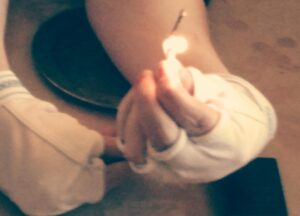
But here’s the other thing Spoon Theory doesn’t address to the chronic pain uninitiated. Whether it is the stranger on the street or a government agency, these individuals frequently make overarching generalizations of an individuals overall health, ability and needs based on a snapshot moment in time. They think these spoons are gifts to be used sparingly and responsibly. Some may even feel entitled to prescribe how one’s spoons should be allocated. Particularly if the cripple in question is on disability. Here’s where Match Theory gets bad-ass.
These are my goddam matches.
I decide when and where to light them and how long to let them fucking burn.
End of fucking story.
So, you saw the girl who parked in handicapped parking tearing it up on the dance floor. That’s her business. Not yours. She may be burning five fucking matches at once and the instant the music shuts off maybe she will too. Those few short feet to her car may be the most painful of the night. But they will have been worth it. She needed the dance. Needed to feel alive. Needed to move. Tomorrow she’ll lie in bed like the tin man, a scorch mark on the night stand next to her but tonight she forgot the pain, forgot the doctors, the drugs and the disfigurements. Tonight she lived.
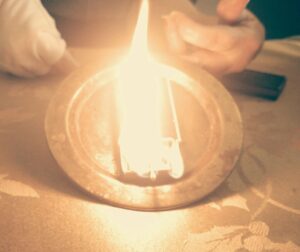
To learn more about Spoon Theory, please visit Christine Miserandino’s original piece on “But You Don’t Look Sick”.
The Spoon Theory written by Christine Miserandino
https://en.wikipedia.org/wiki/Spoon_theory
The spoon theory is a disability metaphor used to explain the reduced amount of energy available for activities of daily living and productive tasks that may result from disability or chronic illness. Spoons are an intangible unit of measurement used to track how much energy a person has throughout a given day.

